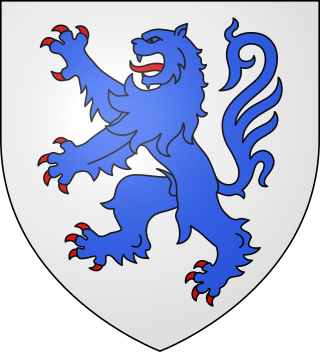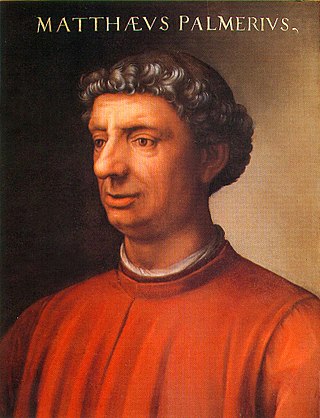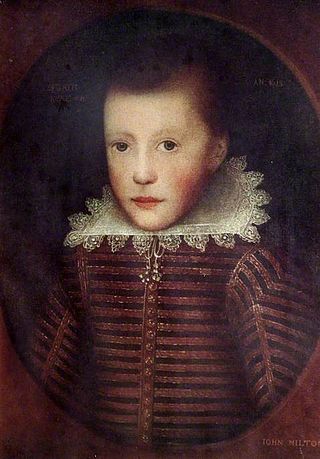Related Research Articles

The Duchy of Athens was one of the Crusader states set up in Greece after the conquest of the Byzantine Empire during the Fourth Crusade as part of the process known as Frankokratia, encompassing the regions of Attica and Boeotia, and surviving until its conquest by the Ottoman Empire in the 15th century.

Laonikos Chalkokondyles, Latinized as Laonicus Chalcocondyles was a Byzantine Greek historian from Athens. He is known for his Demonstrations of Histories in ten books, which record the last 150 years of the Byzantine Empire.

The Acciaioli family, also spelled Acciaiuoli, Accioly, Acciajuoli or Acioli was an important Italian noble family from Florence, whose members were the ruling Dukes of Athens.

Donato Acciaioli was an Italian scholar and statesman. He was known for his learning, especially in Greek and mathematics, and for his services to his native state, the Republic of Florence.
Angelo II Acciaioli was an Italian Catholic cardinal.
Carlo I Tocco was the hereditary Count palatine of Cephalonia and Zakynthos from 1376, and ruled as the Despot of Epirus from 1411 until his death on July 4, 1429.

The Duchy of Neopatras was a principality in southern Thessaly, established in 1319. Officially part of the Kingdom of Sicily, itself part of the Crown of Aragon, the duchy was governed in conjunction with the neighbouring Duchy of Athens, it enjoyed a large degree of self-government. From the mid-14th century, the duchies entered a period of decline: most of the Thessalian possessions were lost to the Serbian Empire, internal dissensions arose, along with the menace of Turkish piracy in the Aegean and the onset of Ottoman expansion in the Balkans. Enfeebled, the Catalan possessions were taken over by the Florentine adventurer Nerio I Acciaioli in 1385–1390. The title of Duke of Neopatras was held by the heir of the King of Sicily.

Nerio I Acciaioli or Acciajuoli was the de facto Duke of Athens from 1385 to 1388, after which he reigned uncontested until his death in 1394. Born to a family of Florentine bankers, he became the principal agent of his influential kinsman, Niccolò Acciaioli, in Frankish Greece in 1360. He purchased large domains in the Principality of Achaea and administered them independently of the absent princes. He hired mercenaries and conquered Megara, a strategically important fortress in the Duchy of Athens, in 1374 or 1375. His troops again invaded the duchy in 1385. The Catalans who remained loyal to King Peter IV of Aragon could only keep the Acropolis of Athens, but they were also forced into surrender in 1388.

Nerio II Acciaioli (1416–1451) was the Duke of Athens on two separate occasions from 1435 to 1439 and again from 1441 to 1451.

Antonio I Acciaioli, also known as Anthony I Acciaioli or Antonio I Acciajuoli, was Duke of Athens from 1403.

Antonio II Acciaioli was the Duke of Athens from 1439 to 1445.

Matteo di Marco Palmieri (1406–1475) was a Florentine humanist and historian who is best known for his work Della vita civile which advocated civic humanism, and his influence in refining the Tuscan vernacular to the same level as Latin. He was sent as Florentine ambassador to the court of Alfonso of Naples. Vespasiano da Bisticci included him among the illustrious men of his generation whose careers deserved an article in his Vite di uomini illustri del secolo XVvita.

The Lives of the Most Excellent Painters, Sculptors, and Architects, often simply known as The Lives, is a series of artist biographies written by 16th-century Italian painter and architect Giorgio Vasari, which is considered "perhaps the most famous, and even today the most-read work of the older literature of art", "some of the Italian Renaissance's most influential writing on art", and "the first important book on art history".

Angelo Acciaioli was an Italian Roman Catholic bishop from Florence.
The Accademia degli Svogliati was a 17th-century association of Italian men of letters in Florence. It began as a conversation on 5 November 1620 at the house of Jacopo Gaddi, where it continued to meet. It did not however acquire a name, an emblem or a statute until 22 January 1637. It flourished until about 1648. Gaddi was the driving force behind the Svogliati, as evidenced by the title of its statutes: "Statuti dell' Accademia degli Svogliati sotto il Principato dell'Illustrissimo Signore Jacopo Gaddi, suo Primo Principe e Promotore stabiliti".

John Milton wrote poetry during the English Renaissance. He was born on 9 December 1608 to John and Sara Milton. Only three of their children survived infancy. Anne was the oldest, John was the middle child, and Christopher was the youngest.

Niccolò Acciaioli or Acciaiuoli was an Italian noble, a member of the Florentine banking family of the Acciaioli. He was the grand seneschal of the Kingdom of Naples and count of Melfi, Malta, and Gozo in the mid-fourteenth century. He was the son of Acciaiolo, a wealthy Florentine merchant. He had a sister by the name of Andrea Acciaioli.
Dorotheus I was the Greek Orthodox metropolitan bishop of Athens from c. 1388 to 1392, and the first to reside in the city since 1205.
Bartolomea Acciaioli or Acciajuoli was the wife of Theodore I Palaiologos, Despot of the Morea from 1385. She was the elder daughter of Nerio I Acciaioli, who held large estates in Frankish Greece. She was famed for her beauty and her father gave her in marriage to the Despot to seal their alliance. Since her father and husband's relations deteriorated in the early 1390s, her father disinherited her in favor of her younger sister, Francesca, and their illegitimate brother, Antonio. Barolomea died childless.
Francesca Acciaioli or Acciajuoli was the wife of Carlo I Tocco, Count Palatine of Cephalonia and Zakynthos.
References
- Masson, David (1859). The Life of John Milton. Boston: Gold and Lincoln.
- Setton, Kenneth M. (1975). Catalan Domination of Athens 1311–1380. London: Variorum.